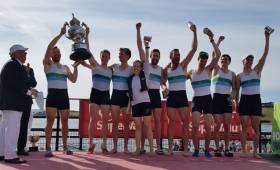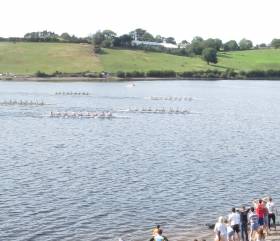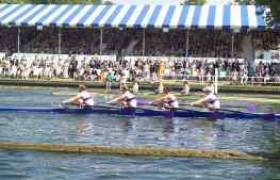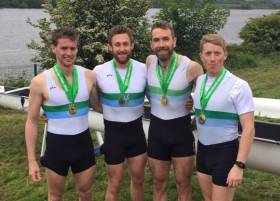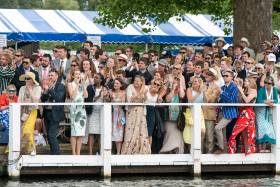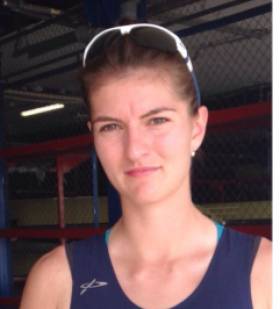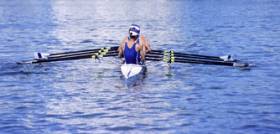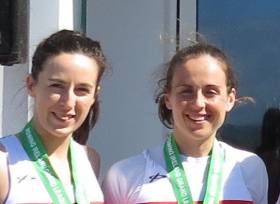Displaying items by tag: commercial
Commercial Eight the Afloat Rowers of the Month
#Rowing: July 2017 was one of the most successful months for Irish rowing. There were multiple medals at international regattas: the World Cup in Lucerne, gold and bronze; the Under-23 World Championships, two bronze medals; Coupe de la Jeunesse, five gold medals; six wins at the Home International Regatta; a good showing by the Clonmel junior quadruple at Henley Royal Regatta.
The Irish Rowing Championships regatta was the biggest ever. NUIG took nine titles. Enniskillen won the junior women’s and men’s eights (and fours) and the junior 16 women’s and men’s eights. Three Castles, with two wins, and UCC with a breakthrough win at novice level, had reasons to celebrate. Cork Boat Club and Bann could boast the champion junior single scullers as part of their three wins.
Skibbereen’s top-rank rowers, usually ruled out by the international programme which sees them bring glory to their country, came to the show and helped the club to seven titles. Two Olympians, Sanita Puspure and Claire Lambe, took titles for Old Collegians and also helped UCD/Old Collegians to take the women’s senior eights crown. UCD had also won the women’s senior pair and the men’s intermediate eight.
Year after year, the men’s senior eights final is the highlight of the Championships. This time out the Skibbereen eight could call on some of the best lightweight rowers in the world. The race was magnificient. In the closing stages, NUIG looked like they might revive the days of their domination; Skibbereen charged to the line. Commercial won. A crew of club rowers had put everything on the line and gained their reward.
They are the Afloat Rowers of the Month.
Rower of the Month awards: The judging panel is made up of Liam Gorman, rowing correspondent of The Irish Times, and David O'Brien, editor of Afloat magazine. Monthly awards for achievements during the year will appear on afloat.ie. Keep a monthly eye on progress and watch our 2017 champions list grow.
#Rowing: The big crowds saw a close and exciting senior men’s eight final at the Irish Rowing Championships. Commercial carved out a small lead early on, and despite pressure from NUIG and Skibbereen, they held on to win.
In the women’s senior eights final, UCD/Old Collegians had to wait until the middle stages to take over in the lead, but once they did they built and built on it. They had over three seconds at the finish over Skibbereen/UCC.
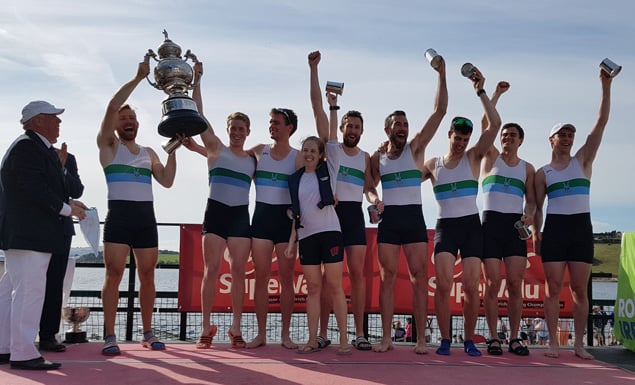 Winners of senior men’s eights (Commercial)
Winners of senior men’s eights (Commercial)
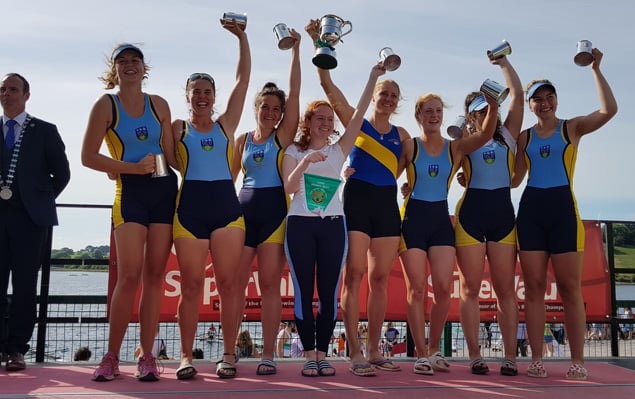 Winners of senior women’s eights (UCD/Old Collegians – Claire Lambe not included)
Winners of senior women’s eights (UCD/Old Collegians – Claire Lambe not included)
NUIG took their ninth title as they lifted the women’s club eight, while Enniskillen brought a very successful end to a good regatta for them by taking the men’s junior pair through Aaron Johnston and Nathan Timoney.
Three Castles also had a fruitful Championships and their junior quadruple won.
Lee and Clonmel won the women’s junior quad and the men’s intermediate double respectively and Bann’s Hannah Scott took the women’s intermediate single sculls title.
Irish Rowing Championships, National Rowing Centre, Day Three (Selected Results)
Men
Eight – Senior: 1 Commercial 5:46.04, 2 Skibbereen 5:47.95, 3 NUIG 5:48.39. Novice: Queen’s 6:21.56.
Four – Club, coxed: NUIG A 6:43.38.
Pair – Inter: NUIG 6:56.09. Junior: Enniskillen B 6:52.04.
Sculling, Quadruple – Junior: 1 Three Castles 6:21.53, 2 Shandon 6:22.75, 3 Clonmel 6:23.05.
Double – Inter: Clonmel 6:37.17. Junior: Three Castles A 6:50.22.
Single – Lightweight: Skibbereen (G O’Donovan) 7:22.32. Inter: Clonmel (D Lynch) 7:10.25.
Women
Eight – Senior: 1 UCD/Old Collegians 6:24.84, 2 Skibbereen/UCC 6:27.96, 3 NUIG/Cork 6:33.67. Club: NUIG 6:46.97.
Four – Inter, coxed: NUIG 7:23.65.
Pair – Senior: UCD (A Crowley, E Lambe) 7:37.41. Junior: Fermoy 7:53.37.
Sculling, Quadruple – Junior: Lee 6:54.96.
Single – Senior: Old Collegians (S Pupsure) 8:02.64. Lightweight: Skibbereen (D Walsh) 8:09.96. Inter: Bann (H Scott) 7:55.58. Club One: Carlow (C Nolan) 8:15.22.
Commercial Edged Out by A Foot at Henley Royal Regatta
#Rowing: Commercial made their exit from Henley this morning in a tightly fought quarter-final of the Wyfold Cup for club fours. The Dublin crew took a lead early over Thames and retained it to beyond halfway. The English crew pushed past them and led, but were warned by the umpire and had to adjust their steering. Commercial came back and looked like they might have done enough. It was not to be. Thames were given the decision by one foot.
Henley Royal Regatta, Day Three (Irish interest)
Wyfold Cup (Club Fours): Thames bt Commercial by 1 foot; 6 min 48 sec.
Facile Win for Commercial in Second Round at Henley
#Rowing: Commercial won again at Henley Royal Regatta today. Their Wyfold club four beat Curlew with plenty to spare to progress to Friday’s competition. The London crew veered markedly towards Commercial at the start, and Commercial also crabbed to their right. Commercial then took control and were able to paddle home past the Enclosures and still win by four and a quarter lengths.
Henley Royal Regatta, Day Two (Irish interest)
Diamond Sculls (Open Single Sculls): J Stimpson bt N Kenny 3¼ l.
Temple Cup (College Eights): University of California, Berkeley bt Trinity 2½ l.
Wyfold (Club Fours): Commercial bt Curlew 4 ¼ l.
Commercial Rowers Ease to First-Round Win at Henley
#Rowing: Commercial had an easy win in the first round of the Wyfold Cup for club fours at Henley Royal Regatta today. Their opponents, Molesey B, made a mess of the start, veering across towards the Dublin crew and being warned. Commercial’s experienced crew of Mike Corcoran, Fionnán Groome, Colm Dowling and Shane Mac Eoin dealt with it all calmly. They moved into the lead and won, easing up, by one and a half lengths.
They are set to take on Curlew on Thursday.
Henley Royal Regatta, Day One (Irish interest)
Temple (College Eights): Trinity bt Pembroke College, Oxford by 2/3 l; 6 mins 29 sec.
Wyfold (Club Fours): Commercial bt Molesey B by 1½ l; 7:16.
Prince Albert (College Coxed Fours): Deerfield Academy (United States) bt Trinity by 5ft; 6:59.
Fawley (Under-18 Boys’ Quadruples): Clonmel bt Malvern Preparatory School B, United States by 2½ l; 6:55.
Commercial Top Crew at Metro Regatta
#Rowing: Commercial won the men’s senior eights at the Metropolitan Regatta at Blessington today. The champions of Ireland had eight seconds to spare over UCD’s senior eight. Killorglin’s Monika Dukarska, who will also compete at London Metropolitan Regatta, won the women’s single sculls with a big margin to spare.
Metropolitan Regatta, Blessington Lakes, Saturday
Men
Eight – Division One – A Final: 1 Commercial (sen) 5:44.371; 3 UCD (intermediate) 5:57.184; 5 Neptune (junior 18A) 6:12.357. Div Two – A Final: Neptune (club two) 5:32.007; 3 UCD (nov) 5:50.023; 5 Blackrock (jun 18B) 6:27.915. Masters – A Final: St Michael’s C.
Four – Div One – A Final: Commercial (sen) 5:28.2o7.
Four, coxed – Div One – A Final: UCD (sen) 5:52.904; 2 Commercial (inter) 6:00.904; 3 St Michael’s (club one) 6:04.576; 4 Methodist (jun 18A) 6:07.373. Div Two, coxed – A Final: Methodist (jun 18B) 7:02.318; 2 Univ of Limerick (club two) 7:14.084. Masters, coxed – A Final: Galway (d)
Pair – Div One – A Final: Castleconnell (sen) 7:01.158, 2 Three Castles (jun 18A) 7:02.83; 3 Portadown (Club One) 7:03.236. B Final: Offaly (inter) 7:19.0. Div Two: Commercial (sen) 6:15.667; 5 Neptune (inter) 6:34.371; 6 Clonmel (club one) 6:43.012.
Sculling, Quadruple – Div One – A Final: Three Castles (jun 18A) 6:32.051. Div Two, coxed: Castleconnell (jun 16) 7:00.976; 2 Carlow (jun 18B) 7:04.32; 3 Shandon (club two) 7:04.913. B Final: Neptune (nov) 7:58.889.
Double – Div Two – A Final: Three Castles (jun 16) 7:09.056; 2 Carlow (jun 18B) 7:18.963; 4 Shandon (club two) 7:37.214.
Single – Div One – A Final: Castleconnell (F Crowley; sen) 6:43.47; 2 Carlow (J Keating; jun 18A) 6:49.642; 3 Castleconnell (S Haugh; inter) 6:52.799. C Final: 6 Clonmel (O McGrath; club one) 7:11.017.
Div Two: Carlow (A O’Toole; Jun 18B) 6:52.709; 3 Cappoquin (S Landers; Club Two) 6:56.991; 4 Castleconnell (R O’Neill; jun 16) 7:04.710. Masters – A Final: Carlow (N O’Brien).
Women
Eight – Div One – A Final: Commercial (sen) 6:05.32; 2 Commercial (jun 18A) 6:28.524. Div Two – A Final: Shandon (club two) 7:33.916; 2 St Michael’s (jun 16) 7:41.478; 3 Neptune (nov) 7:52.245.
Four – A Final: 1 UCD B (sen) 7:33.677; 4 Commercial (jun 18A) 7:55.24. Div One, coxed: Shandon (Club One) 7:28.331; 3 Commercial (inter) 7:40.237. Div Two, coxed– A Final: UCD (Club Two) 7:07.281.
Pair – Div One – A Final: UCD A (sen) 8:26.503; 4 UCD (inter) 8:54.035; 5 Lee (jun 18A) 8:55.394. B Final: 2 Commercial (club one) 9:33.839.
Sculling, Quadruple – Div One: New Ross (jun 18A) 6:44.305. Div Two, coxed - A Final: Lee (club two) 6:56.124, 2 Castleconnell (jun 16) 6:59.39; 5 Commercial (nov) 7:27.266. B Final: 2 Graiguenamanagh (jun 18B) 7:34.306.
Double – Div One – A Final: Neptune (inter) 6:57.084, 2 Carlow (Club one) 6:58.85. Div Two – A Final: New Ross A (jun 18B) 7:10.012; 3 Garda (club two) 7:36.044; 4 Neptune (jun 16) 7:36.7.
Single – Div One – A Final: Killorglin (M Dukarska; sen) 8:52.378; 2 Carlow (A Byrne; inter) 9:37.974; 3 Carlow (C Nolan; jun 18A) 9:43.755.
Div Two – A Final: Neptune (E Power; club two) 9:48.198; 2 Castleconnell (L O’Brien; jun 16) 9:51.167.
– Masters – A Final: Graiguenamanagh (M Cummins).
Neptune Best Junior Eight as Irish Shine at Ghent
#Rowing: Neptune won the men’s junior 18 eight and Commercial were second at the Ghent International May Regatta in Belgium. Commercial’s Gillian Crowe and Hazel O’Neill won the women’s senior pair.
Commercial crews finished 1-2-3 of the eight crews which competed in the junior women’s pair.
Aaron Keogh of Three Castles won the junior 16 single sculls – first of 39 competitors and Jack Butler of Neptune was third of 28 in the junior 18 singles.
Cork took second in the women’s junior eight, while New Ross were third in the women’s junior quadruple.
Ghent International May Regatta, Belgium (Irish interest; selected results, finals)
Men
Eight: 1 Neptune 6:04.89, 2 Commercial 6:07.61.
Four, coxed – Jun 18: 1 Commercial 7:00.29 (two crews).
Pair – Sen: 2 Commercial (D Joyce, M Maher) 6:57.08. Under-23: 1 St Michael’s (T McKeon, D O’Byrne) 7:14.20, 3 St Michael’s (B McKeon, C Garvey) 7:15.78. Jun 18: 3 St Michael’s (T McKeon, D O’Byrne) 7:11.18.
Sculling
Quadruple – Jun 18: 2 Three Castles 6:21.19.
Double – Jun: 3 Three Castles (R Quinn, O Clune) 6:48.19.
Single: 3 S McKeown 7:25.96. Lightweight: 2 St Michael’s (D O’Connor) 7:21.71. Jun 18: 3 Neptune (J Butler) 7:42.19. Jun 16: 1 Three Castles (A Keogh) 7:38.98.
Women
Eight – Junior: 2 Cork 7:05.83, 3 Commercial 7:20.22.
Four – Jun: 2 Commercial 7:42.63.
Pair – Sen: 2 Commercial (G Crowe, H O’Neill) 7:50.48. Jun: 1 Commercial (A Keogh, S Maxwell) 8:14.43, 2 Commercial (G McNamara, K Dolan) 8:23.96, 3 Commercial (C Ryan, A O’Rourke) 8:39.88.
Sculling, Quadruple – Jun: 3 New Ross 7:22.57.
Irish In the Medals at Ghent Regatta
#Rowing: Irish clubs had some excellent placings on Saturday at the Ghent International May Regatta in Belgium. Commercial and Neptune finished first and second in the junior men’s eight and Commercial also finished second in the women’s junior eight and four, and second and third in the junior women’s pair. The Three Castles junior double of Rory Quinn and Oisin Clune took silver – second of 47 crews which competed. New Ross were the second-placed crew in the junior quadruple.
In the adult events, which generally had smaller entries, St Michael’s had wins through Declan O’Connor, Ben McKeon and Colm Garvey, while Skibbereen’s Orla Hayes won the lightweight women’s single. Sam McKeown of Queen’s University finished second to Dave Bell of Molesey in the senior single sculls.
Ghent International May Regatta, Belgium (Irish interest; selected results; Saturday)
Men
Eight – Junior: 1 Commercial 6:42.02, 2 Neptune 6:47.0.
Four – Junior: 2 Commercial 7:01.64. Four, coxed – Junior: 2 Neptune 7:13.78.
Pair – Senior: 1 Commercial (D Joyce, M Maher) 7:45.01 Under-23 (Two Crews): 1 St Michael’s (B McKeon, C Garvey) 8:22.06, 2 St Michael’s (T McKeon, D O’Byrne) 8:23.88. Lightweight Pair: 1 St Michael’s (B McKeon, C Garvey) 8:09.34. Junior: 2 St Michael’s (T McKeon, D O’Byrne) 7:36.89.
Quadruple – Junior: 2 Three Castles 6:48.14.
Double – Junior: 2 Three Castles (R Quinn, O Clune) 7:18.24.
Single – Senior: 2 Queen’s (S McKeown) 8:03.56. Lightweight: 1 St Michael’s (D O’Connor) 7:05.24. Under-23 Lightweight: 3 Queen’s (M Taylor) 8:13.94.
Women
Eight – Junior: 2 Commercial 7:52.67, 3 Cork BC 8:04.40.
Four – Junior: 2 Commercial 8:18.63, 3 New Ross 8:27.38.
Pair – Senior: 3 Commercial (H O’Neill, G Crowe) 9:06.60. Junior: 2 Commercial (A Keogh, S Maxwell) 8:57.17, 3 Commercial (G McNamara, K Dolan) 9:03.31.
Sculling – Quadruple – Junior: 2 New Ross 7:52.00.
Lightweight Single: 1 Skibbereen (O Hayes) 8:52.88.
UCD Senior Eight the Afloat Rowers of the Month
#Rowing: The Afloat Rowers of the Month for April are the UCD men’s senior eight. The crew, stroked by David O’Malley, beat Commercial, the champions of Ireland, at Skibbereen Regatta. They went on to Trinity Regatta and beat the hosts with another fine performance.
The winning crew at Skibbereen Regatta was: Sam Bolger, Shane O’Connell, Tiarnan Doherty, Max Murphy, Shane Mulvaney, Andrew Griffin, Eoin Gleeson, David O’Malley, Orlagh Reid (cox). James O’Sullivan replaced Shane O’Connell in the crew for Trinity.
Rower of the Month awards: The judging panel is made up of Liam Gorman, rowing correspondent of The Irish Times, and David O'Brien, editor of Afloat magazine. Monthly awards for achievements during the year will appear on afloat.ie. Keep a monthly eye on progress and watch our 2017 champions list grow.
Commercial Women's Eight Beat Hosts at Trinity Regatta
#Rowing: Commercial beat Trinity in the women’s senior eights at Trinity Regatta today. Commercial were the more powerful crew and once they took the lead the held it to win by three and a half lengths. UCD’s senior men’s pair came out on top, while Jack Butler of Neptune was the top junior single sculler.
Trinity Regatta, Islandbridge (Selected Results)
Men
Eight – Club: Trinity bt UCD did not finish. Inter: UCD bt Cork BC row over. Masters: Neptune bt Commercial ½ l.
Four – Club, coxed: Neptune bt UCD A disq. Masters, coxed: Neptune bt Graiguenamanagh easily. Junior, coxed: Commercial bt Neptune row over.
Pair – Senior: UCD bt KSRV Nord easily
Sculling,
Quadruple – Nov, coxed: Commercial bt Sligo easily. Jun 18B, coxed: Commercial bt Blackrock easily. Jun 16: Commercial bt Three Castles 2l.
Single – Inter: Sligo (Patterson) bt Commercial (Casey) easily. Jun 18: Neptune (J Butler) bt Commercial (K Brown) 4l.
Women
Eight – Senior: Commercial bt Trinity 3 ½ l Club, coxed: Commercial bt Trinity 2l. Nov: Trinity A bt KSRV Njord 2l. Jun 16: Graiguenamanagh bt Athlone easily.
Four – Inter, coxed: Trinity B bt Trinity A 1l. Junior, coxed:
Sculling – Double - Senior: Neptune bt KSRV Njord easily.
Single – Inter: Neptune (Feerick) bt Athlone (Curley) easily. Club: Neptune (A Clark) bt Garda (J Ryan) 3l. Jun 16: Neptune (Clarke) bt Neptune (Daymon) 2l.


























